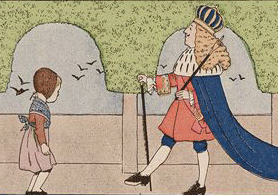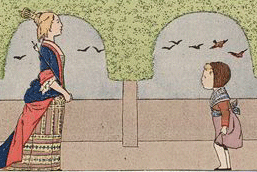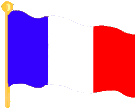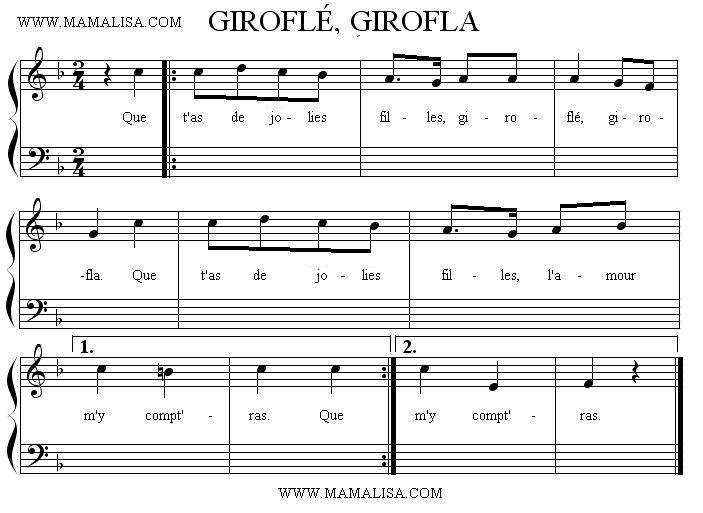Giroflé, girofla
This children's song goes back to the 17th century. Its title inspired an operetta in 1874 with music by Charles Charles Lecocq and the French libretto by Albert Vanloo and Eugène Leterrier. It also inspired Rosa Holt in 1935, who wrote a version denouncing the horrors of war when Hitler came into power.
Each verse is repeated.

Giroflé, girofla
Giroflay, Girofla
Jeu chanté
Singing Game
(French)
(English)
Solo :
Que t'as de jolies filles,
Giroflé, girofla,
Que t'as de jolies filles,
L'amour m'y compt'ra.
Chœur :
Elles sont jeunes et gentilles,
Giroflé, girofla,
Elles sont jeunes et gentilles,
L'amour m'y compt'ra.
Solo :
Donne-moi-z-en donc une,
Giroflé, girofla,
Donne-moi-z-en donc une,
L'amour m'y compt'ra.
Chœur :
Pas seulement la queue d'une,
Giroflé, girofla,
Pas seulement la queue d'une,
L'amour m'y compt'ra.
Solo :
J'irai au bois seulette,
Giroflé, girofla,
J'irai au bois seulette,
L'amour m'y compt'ra.
Chœur :
Quoi faire au bois seulette ?
Giroflé, girofla,
Quoi faire au bois seulette ?
L'amour m'y compt'ra.
Solo :
Cueillir la violette,
Giroflé, girofla,
Cueillir la violette,
L'amour m'y compt'ra.
Chœur :
Quoi fair' de la violette ?
Giroflé, girofla,
Quoi fair' de la violette ?
L'amour m'y compt'ra,
Solo :
Pour mettre à ma coll'rette,
Giroflé, girofla,
Pour mettre à ma coll'rette,
L'amour m'y compt'ra.
Chœur :
Si le roi t'y rencontre ?
Giroflé, girofla,
Si le roi t'y rencontre ?
L'amour m'y compt'ra.
Solo :
J' lui f'rai trois révérences,
Giroflé, girofla,
J' lui f'rai trois révérences,
L'amour m'y compt'ra.
Chœur :
Si la rein' t'y rencontre ?
Giroflé, girofla,
Si la rein' t'y rencontre ?
L'amour m'y compt'ra.
Solo :
J' lui f'rai trois révérences,
Giroflé, girofla,
J' lui f'rai trois révérences,
L'amour m'y compt'ra.
.
Chœur :
Si le diabl' t'y rencontre ?
Giroflé, girofla,
Si le diabl' t'y rencontre ?
L'amour m'y compt'ra.
Solo :
Je lui ferai les cornes,
Giroflé, Girofla,
Je lui ferai les cornes,
L'amour m'y compt'ra.
Solo:
What pretty daughters you have,
Giroflay, girofla,
What pretty daughters you have,
Love will see me there.
Group:
They are young and nice,
Giroflay, girofla,
They are young and nice,
Love will see me there.
Solo:
Do give me one then,
Giroflay, girofla,
Do give me one then,
Love will see me there.
Group:
Not the tiniest bit* of one,
Giroflay, girofla,
Not the tiniest bit of one,
Love will see me there.
Solo:
I'll go into the woods alone,
Giroflay, girofla,
I'll go into the woods alone,
Love will see me there.
Group:
What will you do in the woods alone?
Giroflay, girofla,
What will you do in the woods alone?
Love will see me there.
Solo:
I'll pick violets,
Giroflay, girofla,
I'll pick violets,
Love will see me there.
Group:
What will you do with the violets?
Giroflay, girofla,
What will you do with the violets?
Love will see me there.
Solo:
I'll put them in my ruff**,
Giroflay, girofla,
I'll put them in my ruff,
Love will see me there.
Group:
What if the king meets you there?
Giroflay, girofla,
What if the king meets you there?
Love will see me there.
Solo:
I'll curtsy for him three times,
Giroflay, girofla,
I'll curtsy for him three times,
Love will see me there.
Group:
What if the queen meets you there?
Giroflay, girofla,
What if the queen meets you there?
Love will see me there.
Solo:
I'll curtsy for her three times,
Giroflay, Girofla,
I'll curtsy for her three times,
Love will see me there.
Group:
What if the devil meets you there?
Giroflay, girofla,
What if the devil meets you there?
Love will see me there.
Solo:
I'll make devil horns at him***,
Giroflay, girofla,
I'll make devil horns at him,
Love will see me there.
Notes
*Literally "not even the tail of one". This expression originates in the animal world, "not seeing some animal tail" means not seeing it at all.
**The ruff was a ruffled collar worn at the neck of the shirt and was characteristic of Elizabethan and Jacobean costume.
***To put your index and middle fingers out from both hands on top of your head like devil horns.
Re. the line, "I'll make devil horns at him…" - Monique wrote, "When I was a child we would make devil horns at someone who'd lied or cheated and sometimes out of mere meanness when they lost or just to make fun of them. It consisted in pointing the index and middle finger of both hands above the head towards the child. We would usually chant 'Ouh les cornes ! La tête de loup !' (Oooh! Horns! Wolf head!) -don't ask why or what it really meant, I have no idea, it was just what we'd say in this case. But pointing the index finger and pinkie was totally unknown to us and I've never seen it done around me in France." - Monique
Game Instructions
One of the girls stands alone and the others walk towards her, holding hands. Then they go backwards. The one who's alone does the same. She starts singing the first verse, the others respond by singing the next one and meanwhile, she must mimic the actions she talked about in her verse (like picking up a violet, curtsying, etc.). On the last verse, she mimes "horns" with her fingers and points to her playmates who run away from the threat.


Thanks and Acknowledgements
Translated by Monique and Lisa. Comments by Monique.
Game Instructions come from "Jeux et exercices des jeunes filles" by Marguerite Du Parquet (1860) - translated from the French.
Image: "Vieilles chansons pour les petits enfants avec accompagnements de Ch. M. Widor", illustrator - Louis Maurice Boutet de Monvel.
Merci !


























